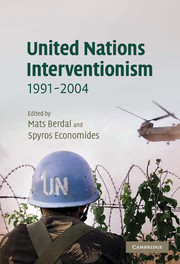6 - Haiti
Published online by Cambridge University Press: 22 September 2009
Summary
Introduction
In 2004, Haiti's fortunes executed a full circle. Shortly after leading the celebrations marking Haiti's bicentennial anniversary of its independence in February 2004, Jean-Bertrand Aristide, three-time president of Haiti, was swept from power by violent rebellion. Aristide's departure and the preceding turmoil, the culmination of a political and economic crisis that had festered for years, provoked a US and French military intervention, shortly thereafter replaced by a United Nations (UN) peacekeeping force to restore order and create the conditions for long term stability and democracy.
These unhappy developments are all the more striking for following on intense international involvement in Haiti's affairs throughout the 1990s. In particular, the UN engaged in a broad range of activities in support of democracy in Haiti, including election monitoring in 1990, UN Security Council (UNSC)-mandated sanctions in 1993–1994, a naval blockade in 1993–1994, UNSC-authorised use of force in 1994 against the military regime that had removed Aristide from power three years earlier and a major peacekeeping operation (PKO) in the years 1994–1996, subsequently reduced to a small international force aimed at building a domestic police force.
The case offers the first, and to date only, instance of the UNSC authorising the use of force to effect the restoration of democracy within a member state. Unlike in a number of other situations, democratic processes were not seen as a means of national reconciliation, nor were elections seen as a mechanism to anchor fragile peace agreements.
- Type
- Chapter
- Information
- United Nations Interventionism, 1991–2004 , pp. 168 - 191Publisher: Cambridge University PressPrint publication year: 2007

